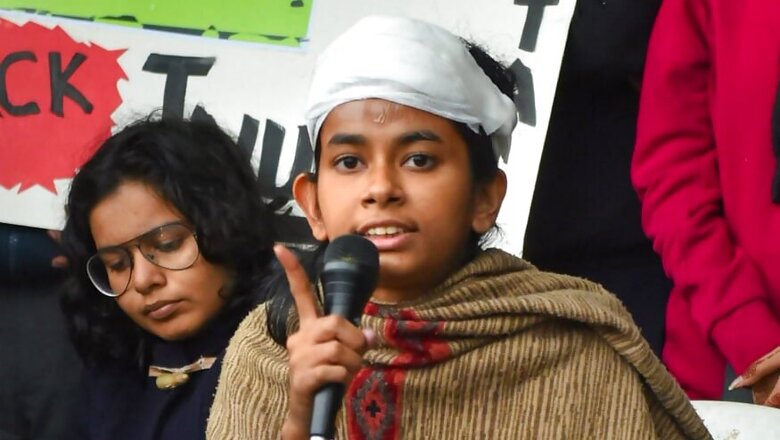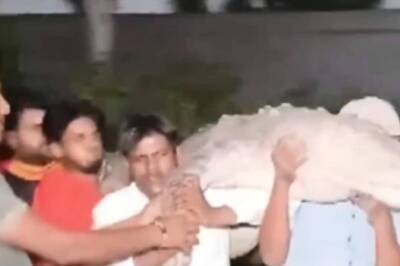‘Academics First’: JNUSU Prez Aishe Ghosh Spells Out Formula to Counter ‘You’re Here to Study’ Taunt

views
New Delhi: It has been a week since unprecedented violence at Delhi's Jawaharlal Nehru University (JNU), in which several students and teachers were injured, left the nation shocked and angry.
On Saturday, media persons assembled outside the outside university's Sabarmati hostel, which was also ransacked by a mob of people on January 5, for a press conference by Jawaharlal Nehru University Students Union (JNUSU) president Aishe Ghosh, vice president Saket Moon and general secretary Satish Chandra Yadav.
A few meters away from the conference area, two female students were watching the livestreaming of the conference. “Aishe is saying we should pay the academic fee and hold on the payment of hostel fees,” observed one girl. The other pitched in, “Now that Aishe has said it, we will pay the hostel fee late.”
Certainly, Ghosh, who weighs just a little over 40 kilograms, carries a lot of gravitas. The university students have termed Delhi Police’s investigation into the Sunday violence as “disappointing” and feel that the FIR against Ghosh is due to a “bias” as the JNUSU president comes from an industrial town of West Bengal.
Amid all these new developments, the primary agitation over proposed hike in hostel and other fees continues, with the students demanding a complete rollback of the new fee structure.
Speaking to News18, Ghosh said she, along with other student leaders, has made several visits to the Ministry of Human Resource Development for negotiations to get their demands fulfilled.
“After several rounds, we made an important progress today. The HRD ministry had said we should take some positive step and make the administration feel that we are keen to look into the problem. So we have told the students that fee hike happened on hostel fee and not on our academic fee. We pay for the academics,” she said.
The academic fee for BA/MA programmes is Rs 108 and Rs 120 for Mphil/PhD courses. “We will fulfill our academic requirements. This will make for a good response for the administration that keeps telling us, ‘you’ve come here to study’. With this formula we convey to the administration and the government that we are interested in academics,” says Ghosh, who intends to excel in academics and research while continuing her fight for the oppressed.
The JNUSU president hopes that after new ‘formula’ proposed by JNUSU regains normalcy on campus, the government would intervene. “Academic requirement will be fulfilled by us with the fee payment and now the HRD ministry must intervene. Our fight for a complete roll back of fee shall continue and we will keep meeting for negotiations even if this takes six months or more,” she added.
The students’ union first met R Subrahmanyam, who was later shifted to the social justice ministry from the HRD ministry -- allegedly over student protests -- and also let their demands be known to the education ministry secretary Amit Khare, who replaced Subrahmanyam.
“We didn’t have to brief Subrahmanyam much. He is himself a product of JNU so he knew everything. Khare doesn’t know much but the MHRD is now listening to us,” Ghosh said.
Ghosh joined the JNU campus in 2016, the same year when M Jagadesh Kumar assumed the role of university’s vice-chancellor. “We have had an extremely bad experience with our current vice-chancellor. Our batchmate Najeeb went missing and till date Kumar has not felt the need to file a single complaint against his disappearance. He has shown such apathy in this matter. Not just this, he even imposed a fine of Rs 20,000 against students who are protesting against the fee hike.”
Ghosh had observed drastic changes on campus before a group of masked people, allegedly affiliated to the Akhil Bharatiya Vidyarthi Parishad (ABVP), attacked the students and professors with rods and stones on January 5.
In her police complaint, she has accused the faculty of threatening her before the January 5 violence, which she terms as “revenge mode.”
“Undermining the autonomy of committees in hostels in discipline by bringing his own audit. Closing down the dhabas at a certain time … the campus is only changing since 2016,” Ghosh says, adding that earlier campus for her was all about dissent and raising voice against injustice.
After last week violence, which left her and several injured and dampened the morale of students, she is focused on restoring normalcy, one step a time.
In this movement fighting against the fee hike, Ghosh has found her president ship at a crucial juncture of building solidarities. “With our movement to ensure education for all, we can see the student unity being built, and that is very important. The movement is getting stronger and university spaces are being saved. This is not happening in isolation – look at Jamia Millia Islamia, Aligarh Muslim University, Shaheen Bagh protests – there are so many solidarities being build.”
“The JNU is not alone in this fight. Look at what’s happening back in my home state. Prime Minister Narendra Modi, who visited West Bengal on Saturday, was told to go back. The protests are happening against CAA, NRC,” she said.
Ghosh says her varsity is a great platform from where it can raise voice for others. “At this moment, the positions and privileges that we have…we can talk about those who are not heard, like the AMU students. Students there faced an attack on their freedom of expression. From this position we voice the concerns of those who are not heard,” said Ghosh.



















Comments
0 comment